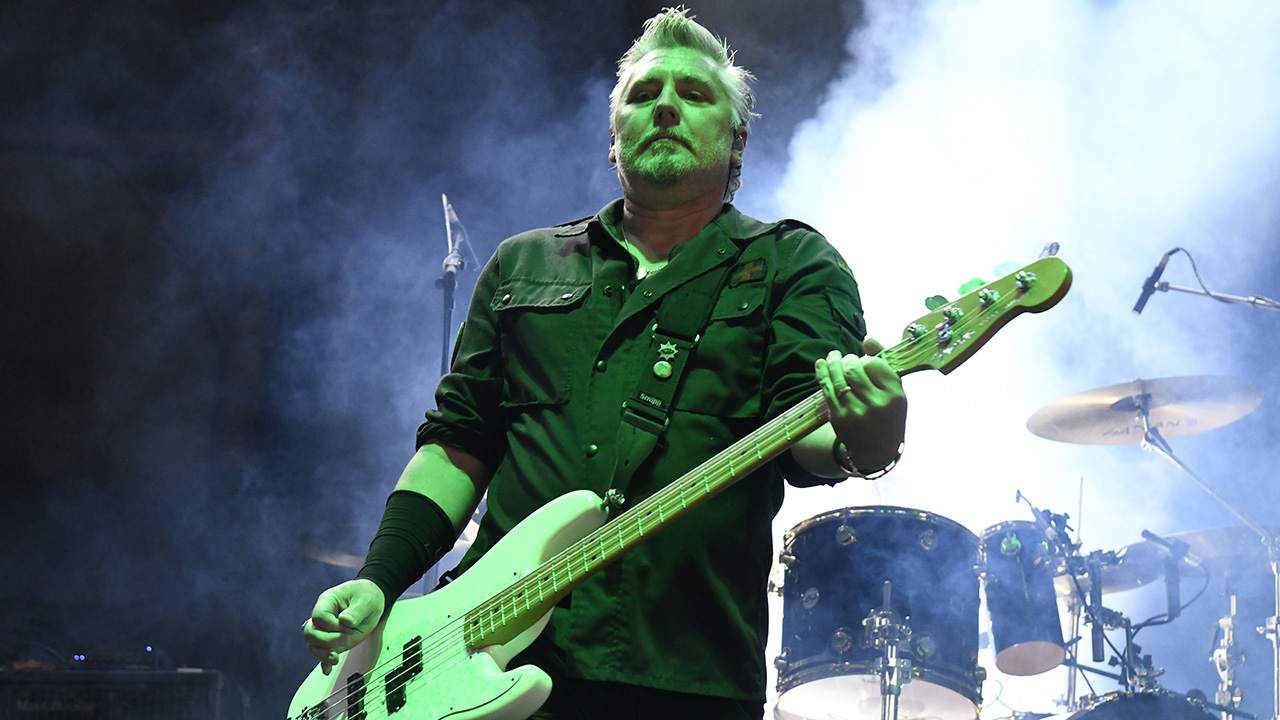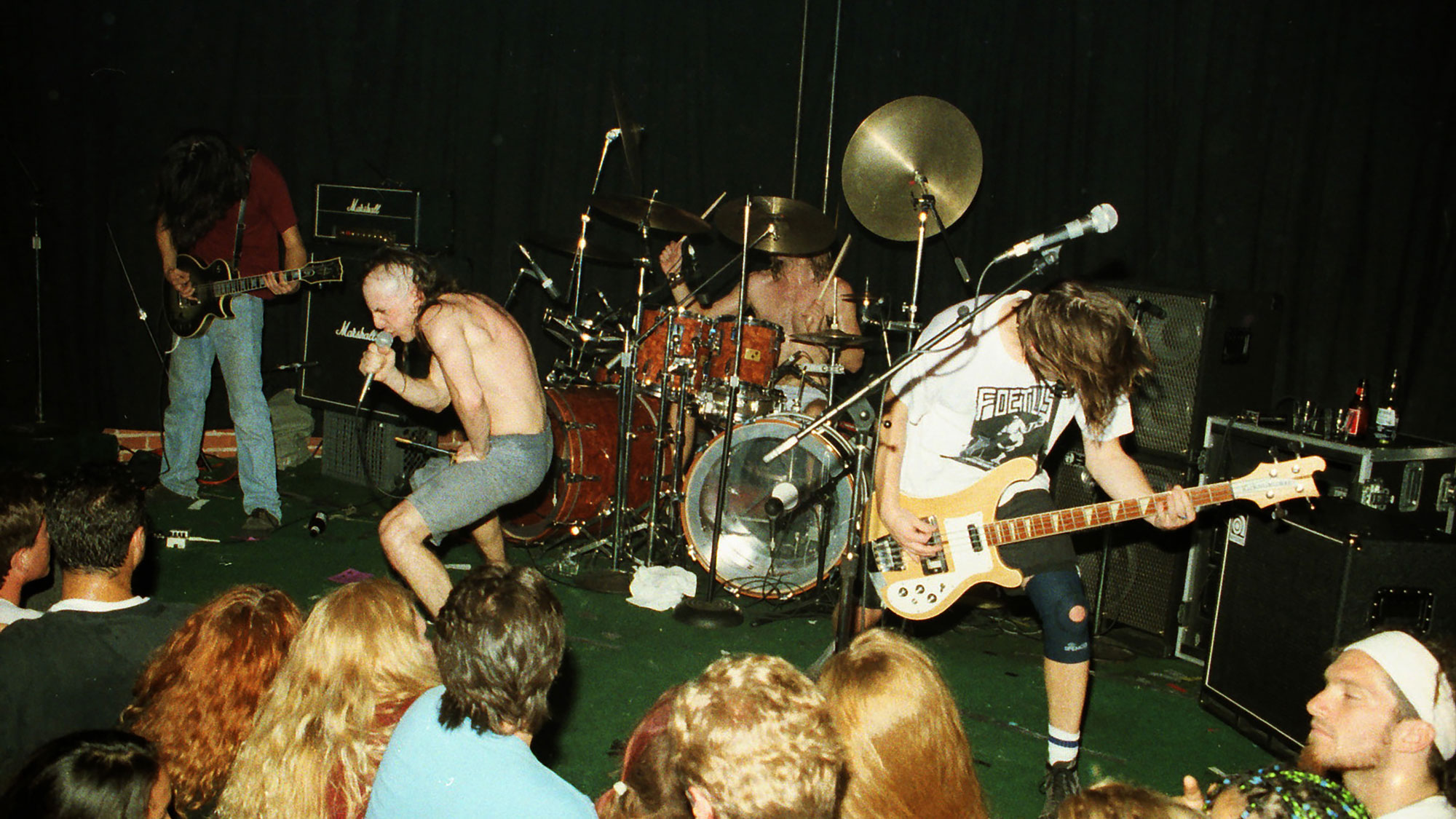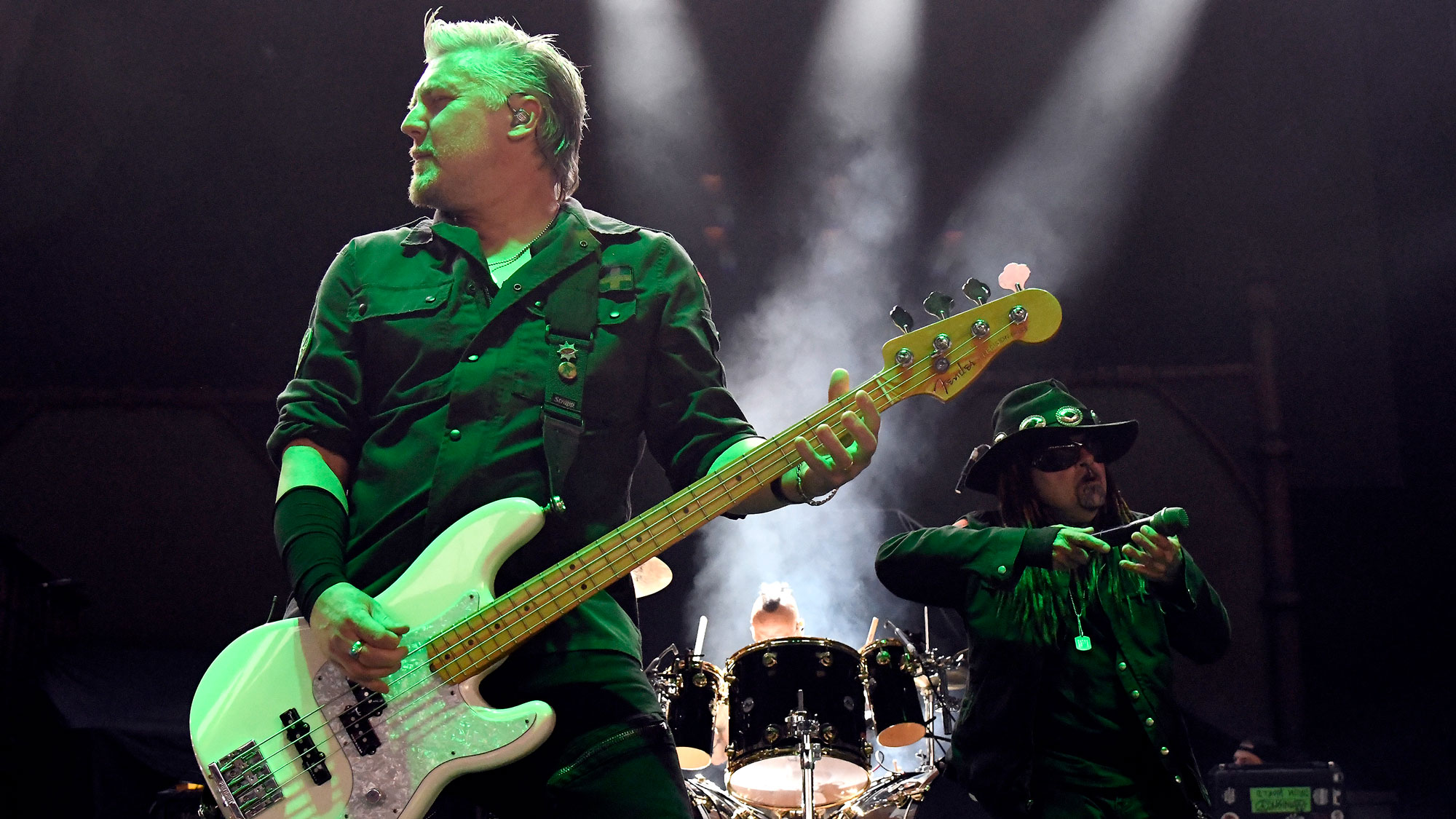
Since 2019, Paul D’Amour has been holding down the low-end for industrial metal legends Ministry. But the Spokane, Washington, native probably identifies just as much with guitar as he does bass.
His lengthy resume includes stops with outfits like Replicants, Lusk and Lesser Key; and he’s possibly best known as becoming Tool’s first bassist after befriending guitarist Adam Jones – a fellow movie industry hopeful with a love for heavy music.
With a Rickenbacker 4001CS in hand, D’Amour was integral to Tool’s debut EP, Opiate (1992), and their inaugural full-length, Undertow (1993). By that point they band felt they were onto something, though the record’s success took them by surprise.
D’Amour’s 4001CS had been paramount to their chugging sound and overall writing process; but that process stalled leading into Ænima, leaving him frustrated and with no choice but to leave in 1995. He remained connected long enough to aid in the recruitment of his replacement, Justin Chancellor.
Since then, D’Amour has followed his muse, leading to myriad projects and a whole lot of guitar playing – not just bass. When Ministry’s Al Jorgensen found himself in need of a four-string mainstay in 2019, D’Amour was happy to oblige.
“It’s cool to play those songs,’ he tells Bass Player. “Even though they were written so many years ago, they still kick ass and people still respond to them. It just shows the power of good music.
“If it transcends time, trends, and all those different things, that’s what matters. I think that Tool is also a testament to that. If you write good shit, people will listen, and it’ll stay relevant.”
How did the bass guitar enter the picture for you?
“There was a little punk scene in Spokane – there were always like 15 bands, and all your friends played in different bands. It was always, ‘We need a bass player, now we need a guitar player, now we need a drummer.’ So eventually, I just sort of rotated around until I figured it all out.”
With Tool, you became known for your aggressive attack and pick playing. What influenced that?
“I was really interested in bands like Nomeansno, a Canadian alternative punk band signed to Alternative Tentacles who played a lot around Seattle. Their bass player [Rob Wright] really impressed me, like more percussive bass players. I was trying to capture a bit of that vibe; but I think in the end, I just ended up doing my own thing.”
What were some of the bands you were in before Tool got started?
I was trying not to sound like a normal bass player, in the background hiding behind the guitar and just supplementing
“Nothing of note – just city, local bands, punk rock bands. When I moved to L.A. I wasn’t really seeking anyone out to play in a band. there was just no work in Seattle at the time. So I came down and was gonna get into the film industry.
“But through that a buddy said, ‘I know these guys and they need a bass player.’ I was like, ‘Well, that could be fun. Let’s try it.’ It sort of took off; we went from zero to 100 in a matter of months.”
You mentioned your film background, which ties into the visual aspect of Tool that’s has been there since the start. Was there a joint vision?
“I think all of us were very aware of how powerful that can be to sort of represent the music. And we just wanted to do something different besides standing up there playing fake air guitar on camera.”
Was it immediately apparent that you were onto something special?
“Maybe. I mean, I was already writing a lot of those riffs on my own. I had things in my head and I wasn’t quite sure where they were gonna end up. I’d been writing a lot on my own, and then we all got together and it started.
“I was able to bring some of that to life, and, you know, Danny Carey is such an amazing drummer; he really affected me as a bass player with his ability to take things and flip them around.”
You had the Rickenbacker 4001CS bass, a big part of your sound. How did that come into play?
“Um, I don’t know! We had gotten a little bit of money when we got a little bit of label interest. I was kind of fucking around with different things, and I had just the 4001 at first, but that didn’t quite have the low end. Then, I got the Chris Squire one [4001CS] and I was like, ‘That’s it. That’s the one!’ It had a bigger body and more body to the sound.
“But honestly, over the years I’ve learned that half of my tone comes from my hands. It’s interesting playing with other people and they’re like, ‘Dude, that just sounds like you. You have this sound.’ And I guess I now know exactly what that is.”
On early songs like Sober and Prison Sex, how would you describe your tone-shaping process?
“I was just trying not to sound like a normal bass player where they’re in the background hiding behind the guitar and just supplementing. I wanted to be more of a character in the music and make it stand out.
I just played what I could get my hands on because I didn’t have any money… Living in Spokane, Washington, you just play whatever broke-ass thing you can find!
“And I don’t think a lot of people really think to do that, you know? They just think they’re supporting songs and holding down the low-end, and that’s great – I love a lot of bands that do that. It’s amazing, but that wasn’t where my head was.”
Why do you think that is?
“I guess because I was more of a guitar player. I have always spent more time playing guitar; that’s like the easiest way for me to write my ideas. With the guitar, you have way more ability to create melody and voicings.
“You can do that a bit on bass, but I can already hear the bass parts when I’m writing on guitar; it sort of goes hand in hand.”
The 4001CS aside, what gear was most integral to your tone?
“Eventually I landed on a Mesa/Boogie 400+ head, and I think I was using a Marshall Guv'nor, which was like an overdrive pedal. That really was the end of it; it was trial and error.
“I just played what I could get my hands on because I didn’t have any money before playing in that band. So all of a sudden, I had this ability – like, ‘Oh, my gosh! Living in Spokane, Washington, you just play whatever broke-ass fucking thing you can find!”
That Replicants album was the funnest… I got to experiment with keyboards, different pedals, play guitar, do vocals. That’s what I need to be doing
Did the success of Undertow take you by surprise?
“Oh, yeah! I never really had any inclination that it would blow up and be sustained. Right now it’s as popular as it ever was. It’s crazy. I always knew we had something like a nice, special energy and it was unique. But no one can predict that stuff.”
It must have been hard to walk away from Tool. What led to that decision?
“I think at the beginning of the band, we were all happy to be there. I’d written a bunch of stuff beforehand, and then those guys had some riffs. It was already kind of there in a weird way; we just had to sort of nurture it.

“We nursed that for several years and multiple tours, playing those same songs, and all that success came. And honestly, I feel like all of a sudden there was this sophomore slump. People started overthinking all the parts, and I never was that way as a musician. I was always somebody that writes out of instinct.
“When we got to writing Ænima, we spent a year and basically wrote five songs. That, to me, was so frustrating. And I think Adam was really in this moment where he was trying to find his voice as a guitar player.
“He was just so unsure about everything, and playing the same parts over and over and over. And I was just like, ‘Oh, my God, I can’t!’ I really couldn't deal with it, you know?
“I just felt like that was never going to end, no matter how much we beat that into the ground and talked about this and that. I’d probably would have left that band 10 times by now because they still operate the same way.
“They make great music – but dude, you don’t need to spend 10 years to make an album, you know? They’re great riffs, but they’re not that complicated.”
They do take a very long time between albums.
“And I think they’re all frustrated in that. I don’t know how those guys stick it out. So I just felt frustrated, and as you know, in that band it was always like, ‘Okay, the bass player can only write the bass parts. A guitar player can only write the guitar parts.’ No one can comment on anything regarding the song except your part.
“But not to me – I don’t think that’s how creative things happen. If you’re in a band, you’ve got to listen, hear each other and expand on ideas. It just felt really stifling for me as a person; I just started doing other shit because I was bored.
People don’t always realize that I worked on Ænima… I’m proud of how the band went on to bring these sounds to the next level
“I did that Replicants cover album, and it was the funnest thing I ever did. It was the first time I got to experiment with keyboards, different pedals, play guitar, do vocals – whatever. I realized that’s what I need to be doing as an artist.”
Interesting. Had you stayed with Tool, do you think the band would look entirely different?
“I don’t know. To some level, I feel like we created a sound that was blossoming at the time of Ænima. I’m not shitting on Tool; I hope I don’t come across as being Mr. Sour Grapes at all, because I’m quite happy with my life, my choices, and what I do creatively.
“When I left the band, Justin was my friend; I invited him to my house, sat on my couch with him and showed him how to play the songs. I showed him how I got all my sounds – my octave pedals, whammy pedals, my phasers – and how I approached these different things.
“I honestly wanted him to be very successful because he seemed pretty nervous about doing it. And so, like I said, that sound already existed.”
When we were creating those Tool records, those early Ministry albums were in heavy rotation
It did – you helped write and arrange five songs from that album: Stinkfist, Ænima, H, Eulogy and Pushit.
“People don’t always realize that I worked on that record. You can hear a big transformation of the sound of the band there and they give Justin credit for bringing that to the band.
“We already wrote and recorded half of that album before I left the band. He just re-recorded my parts verbatim. Actually, someone posted the originals of those songs on YouTube. I’m just wanting people to know that he did not invent that sound out of whole cloth.

“I’m just setting the record straight on this stuff – I’ve never really commented on this before. I also want to make sure that I don’t come across as sounding angry or regretful at all. I’m quite proud of how the band went on to bring these sounds to the next level.”
It seems like you were very graceful with the transition.
“I mean, it definitely was painful. It’s like, you pour your heart and soul into something, watch it blow up, and the whole world is excited about it.
“And then you have this gut feeling that it’s not making you happy anymore. It was really hard to do that. But I knew I couldn’t sustain that in the end with those personalities there – and I’m not gonna name names.”
You’re now playing bass with Ministry. How’d you get the gig?
“I’d met Al a few times back in the ‘90s. We weren’t really in touch, but we had a mutual person who realized I wasn’t playing with anybody. They needed a bass player, and Al hit me up.
“But Ministry was kind of part of my life – when we were creating those Tool records, those early Ministry albums were in heavy rotation. So I feel like I already had some ownership of those songs.”
What’s the most challenging Ministry song to play on bass?
“They’re not necessarily hard songs to play; they’re just really different. There’s a lot of arranged cues, samples, and different things. I don’t really find it challenging technically; I just like those old songs, like N.W.O. and Stigmata. Those are near and dear to my heart, so it’s fun to play them every night.”
Ministry has so much happening, and you have to sort of ride behind all the samples and different layers
What does your bass rig look like these days?
“I’m playing the Fender American Ultra P-Bass. I really love the neck – it’s the C shape, and I can play up high. It’s just a nice sounding bass and fits well with Ministry. Playing the Rickenbacker wouldn’t be the right thing for this band.
“Ministry has so much happening, and you have to sort of ride behind all the samples and different layers. So I’m playing that, and I have the Ashdown ABM-750, the rackmount one. I just got that, and it sounds nice.
“The biggest effect on my tone is these two Darkglass Electronics pedals. One is like a mid-booster thing [harmonic booster], and the other is the Microtubes X [bass preamp], which has this compressor on the low end and it creates this beautiful sound. I just got that, and it’s really knocking my socks off.”
What piece of advice you’d give to someone just breaking into the industry?
“You’ve gotta really fucking want to do it. Don’t be half-assed, or have one foot out the door to be safe. You’ve got to just commit to it. That’s what I’ve always wanted to do. Even when I was a kid, I just knew it – I just didn’t know how to do it, or if it was possible.
“And don’t try to be like anybody else. Try and listen to your inner voice and inner artist. Because I believe that’s a real thing; it exists in everybody. Everybody has something amazing and creative to offer if they just listen to that.”
- Ministry hit the road again in August.







